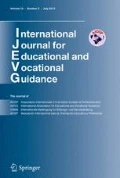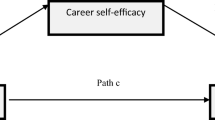Abstract
The purpose of this study is to examine the effects of LGB identity on career decision-making self-efficacy. This study utilizes a mediation model that incorporates a personal (self-compassion) and an environmental (social support) factor as key model variables. Mediating effects of social support and self-compassion were found. Specifically, LGB identity was associated with social support, which in turn was linked with increased self-compassion, resulting in greater self-efficacy in career decision-making.
Résumé
L’identité LGB et le sentiment d’efficacité vocationnelle parmi les étudiants appartenant à des minorités sexuelles
Le but de cette étude était d’examiner les effets de l’identité LGB sur le sentiment d’efficacité vocationnelle. Ainsi, l’étude a testé un modèle de médiation qui incluait un facteur personnel (l’auto-compassion) et un facteur environnemental (le soutien social) comme variables principales. Des effets médiateurs du soutien social et de l’auto-compassion ont été trouvés. Plus précisément, l’identité LBG était associée au soutien social, qui lui, en retour, était lié à un niveau d’auto-compassion plus élevé, ce qui a conduit à un meilleur sentiment d’efficacité vocationnelle.
Zusammenfassung
LGB-Identität und Selbstwirksamkeit hinsichtlich Laufbahnentscheidungen von Studentinnen und Studenten sexueller Minderheiten
Das Ziel dieser Studie war es, den Zusammenhang von LGB-Identität auf die Selbstwirksamkeit hinsichtlich Laufbahnentscheidungen zu untersuchen. Die Studie verwendete dazu ein Modell, welches persönliche (Selbstmitleid) und umweltbezogene (soziale Unterstützung) Faktoren als Mediatoren einbezieht. Es konnten Mediatoreffekte von sozialer Unterstützung und Selbstmitleid nachgewiesen werden. Insbesondere war die LGB-Identität mit sozialer Unterstützung verbunden, die wiederum positiv mit Selbstmitleid verbunden war. Diese Ausgangslage führte schliesslich zu einer größeren Selbstwirksamkeit, was Laufbahnentscheidungen anbelangte.
Resumen
La identidad LGB y la autoeficacia en la toma de decisiones profesionales entre los estudiantes universitarios de minorías sexuales
El propósito de este estudio fue examinar los efectos de la identidad de miembros del colectivo LGB en la autoeficacia de la toma de decisiones profesionales. Este estudio utilizó un modelo de mediación que incorpora un factor personal (autocompasión) y uno ambiental (apoyo social) como variables modelo clave. Se encontraron efectos de mediación del apoyo social y la autocompasión. Específicamente, la identidad de los miembros del colectivo LGB se asoció con el apoyo social, que a su vez se vinculó con un aumento de la autocompasión, lo que se tradujo en una mayor autoeficacia en la toma de decisiones profesionales.

Similar content being viewed by others
Change history
02 February 2021
A Correction to this paper has been published: https://doi.org/10.1007/s10775-021-09463-6
References
Anderson, J. C., & Gerbing, D. W. (1988). Structural equation modeling in practice: A review and recommended 2-step approach. Psychological Bulletin, 103(3), 411–423. https://doi.org/10.1037/0033-2909.103.3.411.
American Counseling Association. (2014). The ACA code of ethics. Alexandria, VA: Author.
Betz, N. E., Klein, K. L., & Taylor, K. M. (1996). Evaluation of a short form of the career decision-making self-efficacy scale. Journal of Career Assessment, 4(1), 47–57. https://doi.org/10.1177/106907279600400103.
Brown, S. D., & Lent, R. W. (2016). Vocational psychology: Agency, equity, and well-being. Annual Review of Psychology, 67, 541–565. https://doi.org/10.1146/annurev-psych-122414-033237.
Bubic, A. (2017). The relevance of self-evaluations for students’ career optimism. Journal of Employment Counseling, 54, 100–114. https://doi.org/10.1002/joec.12059.
Bullock-Yowell, E., Andrews, L., & Buzzetta, M. E. (2011). Explaining career decision-making self-efficacy: Personality, cognitions, and cultural mistrust. Career Development Quarterly, 59, 400–411.
Canty-Mitchell, J., & Zimet, G. D. (2000). Psychometric properties of the multidimensional scale of perceived social support in urban adolescents. American Journal of Community Psychology, 28(3), 391–400. https://doi.org/10.1023/a:1005109522457.
Cass, V. (1979). Homosexual identity formation: A theoretical model. Journal of Homosexuality, 4(3), 219–235.
Chao, R. C. (2012). Managing perceived stress among college students: The roles of social support and dysfunctional coping. Journal of College Counseling, 15(1), 5–21. https://doi.org/10.1002/j.2161-1882.2012.00002.x.
Cohen, S., Underwood, L. G., & Gottlieb, B. H. (2000). Social support measurement and intervention: A guide for health and social scientists. London: Oxford University Press.
Crews, D., & Crawford, M. (2015). Exploring the role of being out on a queer person’s self-compassion. Journal of Gay & Lesbian Social Services, 27(2), 172–186.
D’Augelli, A. R. (1994). Identity development and sexual orientation: Toward a model of lesbian, gay, and bisexual development. In E. J. Trickett, R. J. Watts, & D. Birman (Eds.), Human diversity: Perspectives on people in context (pp. 312–333). San Francisco, CA: Jossey-Bass.
DeGarmo, D. S., & Martinez, C. R., Jr. (2006). A culturally informed model of academic well-being for Latino youth: The importance of discriminatory experiences and social support. Family Relations: An Interdisciplinary Journal of Applied Family Studies, 55(3), 267–278. https://doi.org/10.1111/j.1741-3729.2006.00401.x.
Dyar, C., Feinstein, B. A., Eaton, N. R., & London, B. (2016). Development and initial validation of the sexual minority women rejection sensitivity scale. Psychology of Women Quarterly, 40(1), 120–137. https://doi.org/10.1080/10538720.2015.1022272.
Garcia, P. R. J. M., Restubog, S. L. D., Bordia, P., Bordia, S., & Roxas, R. E. O. (2015). Career optimism: The roles of contextual support and career decision-making self-efficacy. Journal of Vocational Behavior, 88, 10–18. https://doi.org/10.1016/j.jvb.2015.02.004.
Gainor, K. A. (2000). Including transgender issues in lesbian, gay, and bisexual psychology: Implications for clinical practice and training. In B. Greene & G. L. Croom (Eds.), Education, research, and practice in lesbian, gay, bisexual, and transgendered psychology: A resource manual (5th ed., pp. 131–160). Thousand Oaks, CA: Sage.
Gertler, L. M. (2014). The coming out experience, internalized homophobia and self-compassion in LGBQ young adults. Unpublished Doctoral Dissertation, The Write Institute Graduate School of Psychology, Berkley.
Gysbers, N. C., Heppner, M. T., & Johnston, J. A. (2009). Career counseling: Centers, processes, and techniques (3rd ed.). Alexandria VA: American Counseling Association.
Hetherington, C. (1991). Life planning and career counseling with gay and lesbian students. In N. J. Evans & V. A. Wall (Eds.), Beyond tolerance: Gays, lesbians, and bisexuals on campus (pp. 131–145). Alexandria, VA: American College Personnel Association.
Hou, C., Wu, Y., & Liu, Z. (2019). Career decision-making self-efficacy mediates the effect of social support on career adaptability: A longitudinal study. Social Behavior & Personality: An International Journal, 47(5), e8157. https://doi.org/10.2224/sbp.8157.
Hu, L., & Bentler, P. M. (1999). Cutoff criteria for fit indexes in covariance structure analysis: Conventional criteria versus new alternatives. Structural Equation Modeling, 6, 1–55. https://doi.org/10.1080/10705519909540118.
Lent, R. W., Brown, S. D., & Hackett, G. (1996). Career development from a social cognitive perspective. In D. Brown, L. Brooks, & Associates (Eds.), Career choice and development (3rd ed., pp. 373–421). San Francisco, CA: Jossey-Bass.
Lyons, H. Z., Brenner, B. R., & Lipman, J. (2010). Patterns of career and identity interference for lesbian, gay, and bisexual young adults. Journal of Homosexuality, 57(4), 503–524. https://doi.org/10.1080/00918361003608699.
Michael, R., Most, T., & Cinamon, R. G. (2013). The contribution of perceived parental support to the career self-efficacy of deaf, hard-of-hearing, and hearing adolescents. Journal of Deaf Studies and Deaf Education, 18, 329–343. https://doi.org/10.1093/deafed/ent012.
Mobley, M., & Slaney, R. B. (1996). Holland’s theory: Its relevance for lesbian women and gay men. Journal of Vocational Behavior, 48, 125–135.
Mohr, J. J., & Fassinger, R. (2000). Measuring dimensions of lesbian and gay male experience. Measurement and Evaluation in Counseling and Development, 33, 66–90. https://doi.org/10.1037/t07099-000.
Mohr, J. J., & Kendra, M. S. (2011). Revision and extension of a multidimensional measure of sexual minority identity: The lesbian, gay, and bisexual identity scale. Journal of Counseling Psychology, 58(2), 234–245. https://doi.org/10.1037/a0022858.
Nauta, M., Saucier, A., & Woodward, I. (2001). Interpersonal influences on students academic and career decisions: The impact of sexual orientation. Career Development Quarterly, 49, 352–362. https://doi.org/10.1002/j.2161-0045.2001.tb00962.x.
Neff, K. D. (2003a). The development and validation of a scale to measure self-compassion. Self and Identity, 2, 223–250. https://doi.org/10.1080/15298860309027.
Neff, K. D. (2003b). Self-compassion: An alternative conceptualization of a healthy attitude toward oneself. Self and Identity, 2, 85–101. https://doi.org/10.1080/15298860309032.
Neff, K. D., Kirkpatrick, K. L., & Rude, S. S. (2007). Self-compassion and adaptive psychological functioning. Journal of Research in Personality, 41, 139–154. https://doi.org/10.1016/j.jrp.2006.03.004.
Ponterotto, J. G., Riversa, L., & Sueyoshi, L. A. (2000). The career-in-culture interview: A semi-structured protocol for the cross-cultural intake interview. The Career Development Quarterly, 49, 85–94. https://doi.org/10.1002/j.2161-0045.2000.tb00753.x.
Pope, M. (2011). The career counseling with underserved populations model. Journal of Employment Counseling, 48(4), 153–155. https://doi.org/10.1002/j.2161-1920.2011.tb01100.x.
Prince, J. P. (2013). Career development of lesbian, gay, bisexual, and transgender individuals. In S. D. Brown & R. W. Lent (Eds.), Career development and counseling: Putting theory and research to work (pp. 275–299). Hoboken, NJ: Wiley.
Rosario, M., Schrimshaw, E. W., Hunter, J., & Braun, L. (2006). Sexual identity development among lesbian, gay, and bisexual youths: Consistency and change over time. Journal of Sex Research, 43, 46–58.
Russon, J. M., & Schmidt, C. K. (2014). Authenticity and career decision-making self-efficacy in lesbian, gay, and bisexual college students. Journal of Gay & Lesbian Social Services: The Quarterly Journal of Community & Clinical Practice, 26(2), 207–221. https://doi.org/10.1080/10538720.2014.891090.
Schmidt, C. K., Miles, J. R., & Welsh, A. C. (2011). Perceived discrimination and social support: The influences on career development and college adjustment of LGBT college students. Journal of Career Development, 38(4), 293–309. https://doi.org/10.1177/0894845310372615.
Schmidt, C., & Nilsson, J. (2006). The effects of simultaneous developmental processes: Factors relating to the career development of lesbian, gay and bisexual youth. The Career Development Quarterly, 55(1), 22–37. https://doi.org/10.1002/j.2161-0045.2006.tb00002.x.
Shrout, P. E., & Bolger, N. (2002). Mediation in experimental and nonexperimental studies: New procedures and recommendations. Psychological Methods, 7, 422–445. https://doi.org/10.1037/1082-989x.7.4.422.
Stevens, J. P. (2002). Applied multivariate statistics for social science (4th ed.). Hillsdale, NJ: Lawrence Erlbaum.
Tabachnick, B. G., & Fidell, L. S. (2000). Using multivariate statistics (4th ed.). Needham Heights, MA: Allyn & Bacon.
Taylor, K. M., & Betz, N. E. (1983). Applications of self-efficacy theory to the understanding and treatment of career indecision. Journal of Vocational Behavior, 22, 63–81. https://doi.org/10.1016/0001-8791(83)90006-4.
Tomlinson, M., & Fassinger, R. (2003). Career development, lesbian identity development, and campus climate among lesbian college students. Journal of College Student Development, 44(6), 845–860. https://doi.org/10.1353/csd.2003.0078.
Vertsberger, D., & Gati, I. (2015). The effectiveness of sources of support in career decision-making: A two year follow-up. Journal of Vocational Behavior, 89, 151–161. https://doi.org/10.1016/j.jvb.2015.06.004.
Williams, T., Connolly, J., Pepler, D., & Craig, W. (2005). Peer victimization, social support, and psychosocial adjustment of sexual minority adolescents. Journal of Youth and Adolescence, 34, 471–482. https://doi.org/10.1007/s10964-005-7264-x.
Williams, S., Mann, A. K., & Fredric, E. G. (2017). Proximal minority stress, psychosocial resources, and health in sexual minorities. Journal of Social Issues, 73(3), 529–544. https://doi.org/10.1111/josi.12230.
Winderman, K., Martin, C. E., & Smith, N. G. (2018). Career indecision among LGB college students: The role of minority stress, perceived social support, and community affiliation. Journal of Career Development, 45(6), 536–550.
Woodford, M. R., & Kulick, A. (2015). Academic and social integration on campus among sexual minority students: The impacts of psychological and experiential campus climate. American Journal of Community Psychology, 55, 13–24. https://doi.org/10.1007/s10464-014-9683-x.
Woodford, M. R., Kulick, A., & Atteberry, B. (2015). Protective factors, campus climate, and health outcomes among sexual minority college students. Journal of Diversity in Higher Education, 8, 73–87. https://doi.org/10.1037/a0038552.
Wright, S. L., Perrone-McGovern, K. M., Boo, J. N., & White, A. V. (2014). Influential factors in academic and career self-efficacy: Attachment, supports, and career barriers. Journal of Counseling & Development, 92, 36–46. https://doi.org/10.1002/j.1556-6676.2014.00128.x.
Zimet, G. D., Dahlem, N. W., Zimet, S. G., & Farley, G. K. (1988). The multidimensional scale of perceived social support. Journal of Personality Assessment, 52, 30–41. https://doi.org/10.1207/s15327752jpa5201_2.
Funding
Hansori Jang’s work was supported by Hankuk University of Foreign Studies Research Fund.
Author information
Authors and Affiliations
Corresponding author
Additional information
Publisher’s Note
Springer Nature remains neutral with regard to jurisdictional claims in published maps and institutional affiliations.
Rights and permissions
About this article
Cite this article
Jang, H., Smith, C.K. & Duys, D.K. LGB identity and career decision-making self-efficacy among sexual minority college students. Int J Educ Vocat Guidance 21, 61–79 (2021). https://doi.org/10.1007/s10775-020-09428-1
Received:
Accepted:
Published:
Issue Date:
DOI: https://doi.org/10.1007/s10775-020-09428-1



